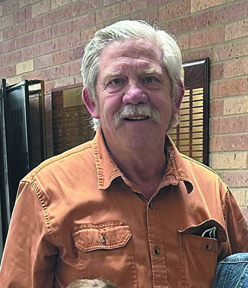PASTOR’S CORNER, Jeff Nagell, Friends Church of Liberal
The church hymnal is becoming a relic in many churches of today. Worship choruses and the contemporary Christian music market are making lyrics, which have words whose meanings are often antiquated, that have driven even staunch defenders of the classic hymns to change the lyrics. As one who grew up singing out of a hymnal, usually to organ music, I long for the days when I knew all the verses of many hymns by heart.
In this, I remember men in matching suits singing four-part harmonies and women in satin gowns matching the men but in a higher octave. The rhythms of the holidays were reflected in the song choices of the choir director, who doubled as the song leader in many instances. It was a church where tradition reigned supreme and codified by both the secular and church calendars.
In the haze of that memory, there is a vision of a time when even public schools had Christmas programs where songs about the Christ child were not only allowed, but somewhat expected. The Thanksgiving pageant at our public schools would have even included a moment of thankful prayer as the costumed children would recite practiced lines about God’s provision in “This new land ...”
It seems Thanksgiving is one of the last untarnished Christian holidays left. Christmas shopping is the new nativity. Halloween does not even acknowledge how it is the pre-holiday for All Saints Day. Mardi Gras is certainly more well known than Lent. The Easter Bunny is the grand marshal of Easter parades. Only our liturgical churches have a grasp of Pentecost, Ascension Sunday or even the sense of sacred and normal days.
It is not that the calendar is as sacred as is the acknowledgement of how every day belongs to the Lord. The seasons themselves reinforce the message of Ecclesiastes, which tells us there is a time for every season. If you’re old enough to remember The Byrds, you can even sing it. In Ecclesiastes, the richest and most powerful king of Israel reflects as an old man on the passing of the years, the building of cities, and being the possessor of great wisdom and a collector of “wives.” His opening words reflect on the futility of life – “There is nothing new that has not already been done” (Ecclesiastes 12:9). This pessimistic view of the present is a warning of what we all spend our lives working for is a repetition of centuries of human struggle.
So, what is the point? Life is a series of events which shape our own destiny. We need markers and touchstones to make sense of the times and seasons. We expect snow in the winter, rain in the spring, warmth in the summer, and changing colors in the fall. Just like we need something to do during the day and rest at night. Traditions are not burdens, they are milestones along the road of life. Celebrating a birthday or a wedding anniversary tells us we have made it another step forward.
But what are we living for?
That is where centering our lives on something that matters is essential, even if it matters only to us. Shared holidays with family and friends ground us in those whose lives have touched ours. The holidays help us remember a time when dreams were all we had, but they were exactly what motivated us. It is good to look at the presents under the Christmas tree and forget how much you spent on them and instead remember when you carefully looked for the ones that were for you. This life we now live is the one we wished for when we were younger.
Eating a turkey dinner with cranberry sauce can remind us as a family of the ritual we evolved into over years of traditions. Setting up Christmas lights can ignite a magical feel of wonder as an entire residential block would be transformed. We live in a world now where we can marvel at innovation and change and yet somehow feel oddly disconnected with the new technology.
The traditions and honoring of the holidays are meant to remind us of how we are born with and born for a purpose. Each milestone marked by another sacred encounter with a Creator who reminds us to rejoice and give thanks. Solomon in Ecclesiastes notes how we are born with eternity in our hearts. New ideas are good, and traditions remind us we have been here before.
Yes, I do miss the old hymns we sang about being thankful and the Pilgrims’ hope in a brand new land. I am equally glad there is a brand new generation singing about the same unchanging God with new lyrics, new melodies, and a new rhythm.








